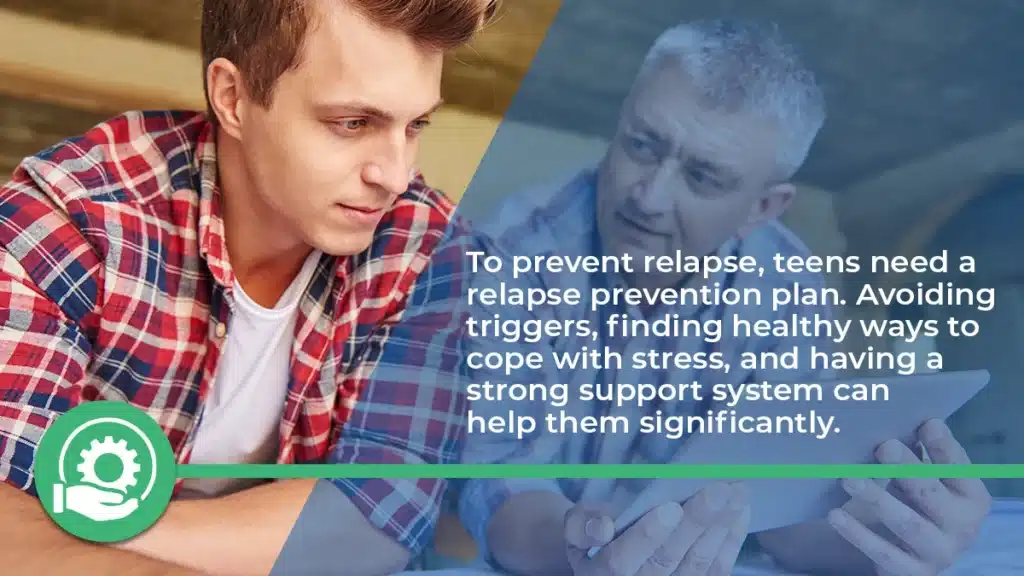Supporting teens in their addiction recovery journey involves a vital aspect known as relapse prevention. This element is essential because it helps teens maintain their sobriety and avoid slipping back into harmful behaviors.
Relapse prevention entails implementing strategies and techniques to help teens identify triggers, cope with cravings, and navigate difficult situations without turning to addictive substances. Continue reading to learn more!
Key Takeaways
Relapse is a part of recovery for many teens, but a relapse prevention plan can make a significant difference. Here is what you need to know:
- Relapse prevention is essential for teens to maintain sobriety and avoid setbacks in their recovery from drug abuse.
- Implementing strategies like identifying triggers and building a support system can help teens prevent relapse.
- CBT equips teenagers with positive coping skills and resilience-building techniques to reduce the risk of relapse.
Contact our teen rehab facility today at (845) 479-6888 to explore how our residential rehab program can support your teen’s recovery journey.

The Connection Between Addiction And Relapse
Addiction and relapse go hand in hand, especially for teens battling substance abuse. Relapse is when someone who’s been trying to quit using drugs starts using them again. It’s like taking a step backward after making progress. Understanding why relapse happens can help parents and loved ones support teens better.
One big reason for relapse is cravings. These are intense desires for the drug. They can come out of nowhere, making it hard to resist using them again. Stress is another trigger. When teens feel overwhelmed or anxious, they might turn to drugs for relief.
Also, being around people or places linked to past drug use can tempt them to start again. Additionally, not having enough support can also lead to relapse. If teens feel lonely or misunderstood, they might think drugs are the only way to cope.
To prevent relapse, teens need a relapse prevention plan. Avoiding triggers, finding healthy ways to cope with stress, and having a strong support system can help them significantly. Even if relapse happens, it’s not the end of the road. It’s a chance for them to learn and keep moving forward.
The Importance Of Relapse Prevention
Relapse prevention is essential in the journey of overcoming substance use disorder (SUD), especially for teenagers. Here’s why it’s so important:
Building Resilience: Relapse prevention is not just about avoiding setbacks but also about building resilience. Teens learn valuable skills to navigate challenges and setbacks without turning to substances for comfort.
Maintaining Progress: Quitting substances is a significant achievement, but staying sober is an ongoing journey. Relapse prevention techniques keep teens focused on their goals and help them stay on the right path.
Protecting Health And Well-Being: Substance abuse can harm physical and mental health. Relapse prevention helps teenagers protect themselves from these dangers, ensuring they can lead healthier lives.
Improving Relationships: Drug and alcohol addiction can strain relationships with family and friends. Relapse prevention teaches teens how to rebuild trust and communication, strengthening their connections with loved ones.
Supporting Academic and Career Goals: Substance abuse can derail academic performance and career aspirations. By preventing relapse, teens can stay focused on their education and career paths.
Promoting Long-term Sobriety: Ultimately, the goal of relapse prevention is to promote long-term sobriety. Relapse prevention sets teens up for success in maintaining a substance-free lifestyle.
Overall, relapse prevention is not just about avoiding a setback; it’s about empowering teens to take control of their lives, make healthy choices, and build a future they can be proud of.
Effective Strategies For Relapse Prevention
Teens battling substance abuse need strong support and practical strategies to avoid slipping back into old habits. Here are key steps that parents and loved ones can take to help prevent relapse.
Identifying Triggers
One of the most important steps in preventing relapse is identifying triggers—those situations, emotions, or people that might lead to a return to substance use. Encourage your teen to be aware of their triggers and to avoid or cope with them effectively.
Developing Coping Skills
Equip your teen with healthy coping mechanisms to deal with negative emotions or stressful situations without turning to substances. This may include mindfulness techniques, stress-reduction exercises, or engaging in hobbies and activities they enjoy.
Building A Support System
Having a strong support system can make a significant difference in preventing relapse. Encourage your teen to connect with supportive friends and family members or participate in support groups, such as Alcoholics Anonymous (AA), where they can share experiences and receive encouragement.
Making Healthy Lifestyle Changes
A healthy lifestyle, including a balanced diet, regular exercise, and sufficient sleep, can contribute to overall well-being and reduce the risk of relapse. Encourage your teen to prioritize self-care and make positive choices for their physical and mental health.
Practicing Self-Care
Help your teen understand the importance of self-care activities such as relaxation techniques, spending time with loved ones, or engaging in activities they enjoy. Taking care of themselves can boost their overall well-being and resilience.
Creating A Relapse Prevention Plan
Work with your teen to develop a detailed plan outlining steps to take if they feel tempted to use drugs or alcohol again. This plan should include strategies for coping with triggers, seeking support, and staying focused on their recovery goals.
Setting Realistic Goals
Setting achievable goals allows teens to experience success and progress in their recovery journey. Breaking down larger objectives into smaller, manageable tasks fosters a sense of accomplishment and motivation.
Addressing Co-Occurring Issues
If your teen is struggling with other mental health issues, such as depression or anxiety, it’s essential to address these issues alongside their substance abuse treatment. Seek professional help if needed to ensure comprehensive care.
Encouraging Open Communication
Maintain open and honest communication with your teen about their recovery journey. Encourage them to share their thoughts, feelings, and concerns with you and assure them that you will support them unconditionally.
Monitoring Progress
Stay actively involved in your teen’s recovery by monitoring their progress and attending therapy sessions or support group meetings together. Keep track of their achievements and setbacks, and adjust strategies as needed to support their ongoing sobriety.
Celebrating Successes
Acknowledge and celebrate your teen’s achievements, no matter how small they may seem. Recognizing their progress can boost their self-esteem and motivation to continue on their path to recovery.
By implementing these strategies and providing ongoing support, parents and loved ones can play a crucial role in helping teens stay on track and avoid relapse.
The Role Of Cognitive-Behavioral Therapy (CBT)
Cognitive-behavioral therapy (CBT) is considered one of the key components in relapse prevention for teens struggling with drug and alcohol use disorder (AUD). Here’s a breakdown of how CBT can be particularly effective for teens in preventing relapse.
Understanding Triggers And Cravings
CBT helps teens identify triggers that lead to substance use. Most common triggers could be environmental (such as being around friends who use drugs), emotional (like stress or anxiety), or cognitive (such as cravings or distorted thinking patterns).
Changing Negative Thought Patterns
CBT focuses on changing negative thought patterns and beliefs that contribute to addictive behaviors. Teens learn to challenge irrational thoughts and replace them with more realistic and positive ones, reducing the likelihood of relapse.
Skill Building
Teens are taught effective coping strategies to deal with stress, peer pressure, and other challenges without resorting to substance use. These skills may include problem-solving techniques, relaxation exercises, and communication skills.
Enhancing Motivation And Self-Efficacy
CBT helps teens build motivation and confidence in their ability to stay sober or manage their symptoms. By setting achievable goals and gradually increasing their self-efficacy, teens become more resilient against relapse triggers.
Addressing Co-Occurring Issues
Many teens with addiction also have underlying mental illnesses such as anxiety or depression. CBT addresses these co-occurring disorders concurrently, providing comprehensive treatment and reducing the risk of relapse.
Family Involvement
Involving family members in CBT sessions can strengthen the teen’s support system. Family therapy sessions can address dysfunctional dynamics and provide a supportive environment for the teen’s recovery journey.
Preventing Future Relapse
CBT equips teens with long-term relapse prevention strategies, teaching them to anticipate and effectively manage potential triggers in the future. By instilling healthy coping strategies and problem-solving abilities, CBT helps teens maintain their progress.
Overall, CBT serves as a valuable tool in relapse prevention for teens. However, it’s essential to combine CBT with other supportive interventions to provide comprehensive care for teens in recovery.
Frequently Asked Questions (FAQs)
What is considered a relapse?
A relapse is when someone who has stopped using drugs starts using them again. It’s a setback in their recovery process. Relapse can happen for many reasons, like stress, cravings, or being around people who use drugs.
Therefore, it’s important to remember that relapse doesn’t mean failure. It’s a sign that more support and coping skills are needed to stay drug-free. If a relapse occurs, it’s crucial to reach out for help from friends, family, or professionals to get back on track toward sobriety.
What are some relapse prevention skills?
Some relapse prevention skills include identifying triggers, developing coping strategies, and building a support network. Learning to manage stress and emotions effectively, practicing self-care, and engaging in healthy activities are also important.
Avoiding high-risk situations and environments where drugs are present, setting realistic goals, and staying committed to recovery plans can help prevent relapse. Regularly attending support groups and therapy sessions and seeking help when needed are crucial for maintaining sobriety.
How important is relapse prevention?
Relapse prevention is crucial for maintaining long-term sobriety. It helps individuals identify potential triggers and develop strategies to avoid or cope with them. By actively engaging in relapse prevention, individuals increase their chances of staying drug-free and leading healthier lives.
It’s an ongoing process that requires commitment and effort, but the rewards of sustained recovery are immense. Relapse prevention not only safeguards against setbacks but also empowers individuals to regain control over their lives and pursue their goals with confidence.
Guiding Teens Towards Hope
Parents, you’re not alone in supporting your teen through their journey to recovery. It’s challenging, but seeking professional help can make all the difference. Our teen rehab facility offers a residential rehab program tailored to their needs.
Our program integrates various therapeutic modalities, including individual counseling, group therapy, family therapy, educational workshops, and recreational activities like art and music therapy. These approaches help teens address the underlying issues contributing to their addiction and develop essential coping skills for long-term sobriety.
Don’t wait any longer to take action. Contact us today at (845) 479-6888 to learn more about how we can support your teen on their journey to recovery.


